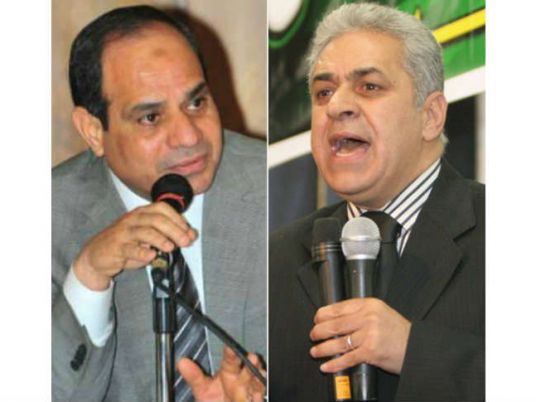
Egyptians vote next week in an election expected to make former army chief Abdel Fattah al-Sisi president, marking a revival of strongman rule three years after the downfall of Hosni Mubarak.
Widely regarded as Egypt's de facto leader since removing the Muslim Brotherhood's Mohamed Morsy from the presidency in July, Sisi faces one challenger for the May 26-27 vote: Hamdeen Sabbahi, a leftist defeated by Morsy in the 2012 election.
Sisi, who is expected to win easily, enjoys backing from Egyptians worn down by political unrest since the 2011 uprising that was driven by demands for social justice and freedom.
Though critics are deeply concerned by the tough political crackdown since Sisi deposed Egypt's first freely elected president, many still view him as a savior for ending Morsy's divisive year in office, which had triggered mass protests that led to his overthrow.
"His history in the military, positions of responsibility and role as an intelligence man mean he knows where our country's interests are," said Ahmed Arafa, 61, newspaper vendor in Cairo. "What concerns the people is security, stability, tourism, investment."
The vote follows the bloodiest chapter in Egypt's modern history. The state has killed many hundreds of Islamists and jailed thousands more, while militants have killed several hundred members of the security forces in ongoing violence.
Members of the pro-democracy movement that led the protests against Mubarak have also been jailed and many cases of torture by the security services have been reported by activists, recalling police abuses that helped ignite the 2011 uprising.
The Brotherhood and its Islamist allies have vowed to escalate a "revolutionary wave" next week, though it has been many months since they were able to mobilize large numbers in the streets. Their protests are now mostly held at universities.
It has urged its supporters to boycott the election.
"Participation in this 'administrative step' gives legitimacy to this coup, even if we were to vote for the rival candidate," said a Brotherhood member in his 20s who declined to be named for fear of arrest. "We continue our struggle."
Moving in lock step with the army, local media run by the state and businessmen loyal to the government have urged a big turnout, battling fatigue among Egyptians for whom this will be the seventh election or referendum in just over three years.
Security concerns mean Sisi has not appeared in public during an election campaign that lasted less than a month. Two plots to kill him have been uncovered, he has said.
"Most of the people are tired of revolution and want stability," said Hassan Nafaa, a political scientist at Cairo University. "At the same time there are a lot of fears … Many fear the return of a new version of the Mubarak regime."
Sisi, 59, will be the sixth military man to run Egypt since the army overthrew the monarchy in 1952, restoring a pattern briefly interrupted by Morsy's one year in office.
FEAR FOR RIGHTS
Sisi will command both executive and legislative powers until a new parliament is elected. Legislative elections are expected later this year. He commands the loyalty of the state institutions that resisted Morsy's rule.
He secured 95 percent of votes cast by Egyptians overseas, though a poll by the Washington-based Pew Research Center suggests a more mixed picture in Egypt, with Sisi viewed favorably by 54 percent and unfavorably by 45 percent.
Though the result appears a foregone conclusion, a big turnout will be seen as a strong mandate for Sisi's rule. Monitors from the European Union and U.S.-funded Democracy International are deploying for the vote.
The election will have a bearing on relations with the United States, which has linked the future of its long-standing military ties with Cairo to the political transition.
Following Morsy's overthrow and the crackdown, the Obama administration suspended much of its $1.3 billion in annual military aid to Cairo. But last month it announced it would resume some of the military assistance, partly to help in the fight against militants.
Security is at the top of Sisi's agenda. The state has implicated the Brotherhood in violence against it, declaring Morsy's movement a terrorist group, a charge it denies. Many of the attacks have been claimed by more radical Islamists.
Sisi's comments suggest his focus will be on economic development in a country steeped in poverty, while political rights may take a back seat. He has said Egypt is not yet ready for full, Western-style democracy.
"There is more than a whiff of the pre-World War II European right in his rhetoric and apparently in his world view: the nationalism, paternalism, strong sense of state, social conservatism, stress on duty and mistrust of parliamentarism and political pluralism," said Nathan Brown, a professor of political science at George Washington University in the United States.
Khaled Dawoud, spokesman for the liberal Dustour Party, likened Sisi to the other strong men who have governed Egypt since 1952.
"He obviously doesn't consider issues like democracy and human rights to be on the top of his agenda," he said.
The Dustour Party is backing Sabahi.
"We have a lot of work to do as democratic forces committed to the January 25 revolution," said Dawoud, in reference to the 2011 demonstrations that led to the toppling of Mubarak.




